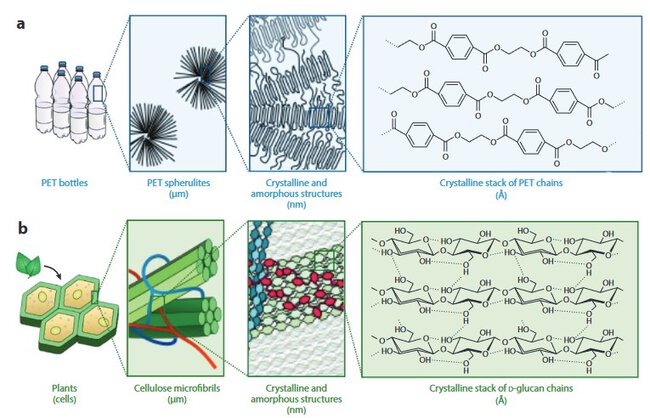 Synthetic polymers such as plastics exhibit numerous advantageous properties that have made them essential components of our daily lives, with plastic production doubling every 15 years. The relatively low cost of petroleum-based polymers encourages their single use and overconsumption. Synthetic plastics are recalcitrant to biodegradation, and mismanagement of plastic waste leads to their accumulation in the ecosystem, resulting in a disastrous environmental footprint. Enzymes capable of depolymerizing plastics have been reported recently that may provide a starting point for eco-friendly plastic recycling routes. However, some questions remain about the mechanisms by which enzymes can digest insoluble solid substrates. We review the characterization and engineering of plastic-eating enzymes and provide some comparisons with the field of lignocellulosic biomass valorization.
Synthetic polymers such as plastics exhibit numerous advantageous properties that have made them essential components of our daily lives, with plastic production doubling every 15 years. The relatively low cost of petroleum-based polymers encourages their single use and overconsumption. Synthetic plastics are recalcitrant to biodegradation, and mismanagement of plastic waste leads to their accumulation in the ecosystem, resulting in a disastrous environmental footprint. Enzymes capable of depolymerizing plastics have been reported recently that may provide a starting point for eco-friendly plastic recycling routes. However, some questions remain about the mechanisms by which enzymes can digest insoluble solid substrates. We review the characterization and engineering of plastic-eating enzymes and provide some comparisons with the field of lignocellulosic biomass valorization.
ANNUAL REVIEW OF CHEMICAL AND BIOMOLECULAR ENGINEERING
Vol. 13
By: Gomes, Margarida; Rondelez, Yannick; Leibler, Ludwik
Published: APR 2022 (Expected final online publication date: OCT 2022)
DOI10.1146/annurev-chembioeng-092120-09105

